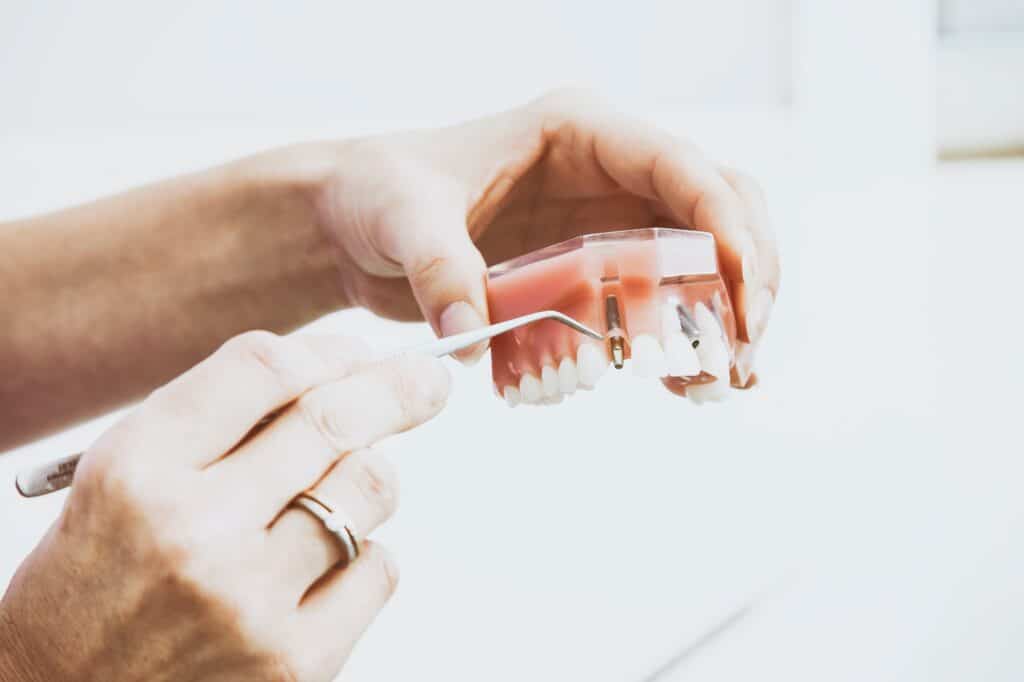Dental Implant FAQ

What to Know About Dental Implants

What Exactly Are Dental Implants?
Dental Implants are a titanium alloy prosthetic tooth root that are used to replace missing teeth. As follows, this functions in place of a natural tooth root, avoiding bone loss in the jaw. Once the implant has fused with your jaw, a permanent abutment and crown are placed on top. Then, the dental implants Grand Junction will look and feel like a natural tooth. If you’ve been searching, “dental implants near me” you’ve come to the right place!
What Kinds of Dental Implants Are There?
The diameter of full-sized dental implants ranges between 3.4 and 5.8 mm. Mini dental implants, on the other hand, have a diameter of 1.8 to 3.0 mm. Our Grand Junction dentist explains that the invasiveness and recuperation duration of your surgery are affected by the size difference.
Because micro implants are smaller, they do not require as much bone density in your jaw to be placed. A ball at the end of a tiny implant allows the crown to snap into place. This crown will have a socket below it to form a secure connection with the implant.
Do you have many or all of your teeth missing? If this is the case, Dr. Eastham, the best dentist in Grand Junction CO, may suggest implant-supported dentures or all-on-6 implants. A detachable implant-supported denture is possible. All-on-6 implants, on the other hand, permanently attach an arch of teeth to your jaw.
What Should I Expect During the Dental Implant Procedure?
The typical dental implant procedure takes many months to complete. However, keep in mind that small dental implants can be obtained in as little as one consultation. Your experience will be entirely determined by the type of dental implant selected.
Consultation
Dr. Eastham will assess if you are a candidate for dental implants during your appointment. In order for us to insert the implants, you must have sufficient bone density in your jaw. Keep in mind, though, that you don’t require as much bone density to be eligible for tiny dental implants.
The treatment we chose will also be determined by the number of teeth you desire to replace. Patients with few or no teeth, for example, may request implant-supported dentures.
Procedure
Additionally, we will do 3D CT scans to assess the health of your jawbone and nerve location. Our practice will also design a precise surgical guide that will be placed over your teeth during the treatment.
The use of a surgical guide reduces the invasiveness of dental implant surgery. Our friends over at OG Dental, Denver Highlands dentist, explain that this is because the implant’s hole is so tiny. Thus, you have a considerably lesser chance of swelling, bleeding, and infection. You will also recuperate far more quickly than if you went to a dentist who did not employ a surgical guide. Dentists who do not employ guides must make a big incision along the gum line all the way down to the bone. This also lengthens and complicates the recuperation process.
Recovery
Whatever dental implants you choose, it is critical that you allow yourself adequate time to heal. While recovering after surgery, soft meals like yogurt and mashed potatoes are ideal.
Following the placement of your implants, you will have multiple visits. As follows, your implants will bond to your jawbone over the course of many months.
Restoration
Then, you will install the permanent abutment and crown over the implant once you have recovered and the implant is stable. As follows, this will offer you the appearance and functionality of a real tooth.
“Dental implants are well worth the investment since they restore both your smile and your dental health. No other tooth replacement solution has this capability!” – Dr. Joshua Eastham
Contact High Desert Dental For Dental Implants Grand Junction
Ready to get started with dental implants? Contact our team at High Desert Dental today. We’d love to discuss your restorative dentistry options.

